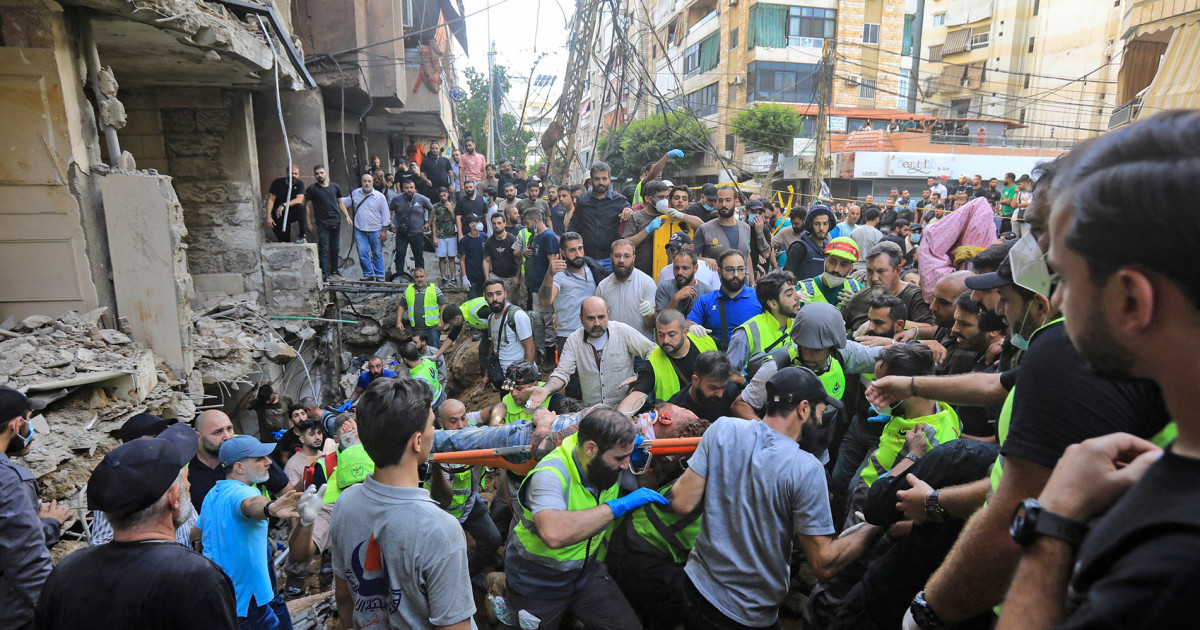The Lebanese National News Agency also reported that an Israeli warplane launched two missiles, targeting an apartment in the Al-Jamous area in the southern suburbs of the capital.
NBC News could not verify those details.
The scenes were reminiscent of the Israeli airstrike in July that killed Fuad Shukr, a senior Hezbollah official.
Earlier, the IDF had struck southern Lebanon, where its air force hit about 100 Hezbollah launchers and other infrastructure sites late Thursday, it said were fired into Israeli territory – one of the heaviest bombings of the area since the two sides began to exchange regular fire. in the wake of the Hamas-led terrorist attack on October 7 and Israel’s assault on the Gaza Strip.
Hezbollah said it responded by bombing an air defense base and a military barracks in northern Israel early Friday. The IDF said about 140 missiles were identified as passing from Lebanon into Israeli territory, with some successfully intercepted.
“Make no mistake: those who harm the people of Israel will pay the price,” Israel’s foreign ministry told X, confirming “intensive Hezbollah rocket fire from Lebanon” toward northern Israel .
It came a day after Hezbollah’s leader gave his much-anticipated response to the device attacks.
“There is no doubt that we have been exposed to a major and severe security and humanitarian blow,” Nasrallah said in a televised address on Thursday.
He accused Israel of an act of war against Lebanon, but stopped short of specifying how or when his group would strike back.
“The enemy crossed all red lines and all laws in this attack,” Nasrallah said, as Israeli warplanes flew over the Lebanese capital, Beirut, creating a deafening sonic boom.
A senior Israeli security official told NBC News that the devices were detonated not as part of a strategic decision, but because the Israeli military was trying to act while it was still possible to use explosives.
“It became a use-it-or-lose-it kind of situation,” the former official said. Israel has not claimed responsibility for the attacks or directly commented on them.
But after months of growing fears about a wider regional conflict, the device attacks came as Israel declared a “new phase” in its deadly but simmering conflict with Hezbollah, which has seen thousands of people move from both sides of the common border.
The escalation has been met with growing calls for moderation, with the United Nations peacekeeping force in southern Lebanon urging on Friday “all actors to immediately desist”.
The UN Security Council will meet later Friday on the explosions.
The White House said Thursday that the United States is “fearful and concerned about potential escalation” in the region, calling a diplomatic solution “achievable” and “urgent.”
Meanwhile, lingering questions remain about how Israel could have planted explosives in thousands of pagers and walkie-talkies that were then distributed among Hezbollah operatives.
Companies in Taiwan and Japan, whose logos appeared on the devices that blew up, have deflected any suggestion of involvement.
Taiwan-based Gold Apollo said earlier this week that the devices were made by a Hungarian firm, BAC Consulting, which it said was authorized to use the company’s logo for product sales in certain regions.
But Hungarian officials said BAC Consulting was just a business intermediary. The company’s CEO, Cristiana Bársony-Arcidiacono, confirmed to NBC News that her company worked with Gold Apollo. But when asked about pagers, she said over the phone, “I don’t do pagers. I’m just the middleman. I think you’re wrong.”
Taiwan’s Economy Minister Kuo Jyh-huei said on Friday that the parts in the pagers that exploded were not made in Taiwan, adding that the case was being investigated by judicial authorities.
Bulgaria’s state security agency also said on Friday that it had “indisputably established” that no pager used in the Lebanon attack was imported, exported or made in Bulgaria after reports that a local company was involved in the sale of pagers.

